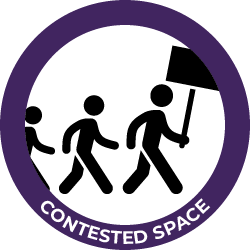Place
Watts Restaurant and Watts Motel
"We may have had a few incidents, and I remember at the Watts Motel, they would throw acid and pee out the window, embarrassing. But they just didn’t want us to integrate, that was the biggest problem."
- Carol Brooks
"They was picketing that place because they wouldn t let Blacks go in there and eat. And they was picketing out there, and one of the professors they started fighting or something. I don t know how it was, but anyway, this professor fell down. And the lady that they owned that restaurant, she urinated in his face. And after that, they never had business anymore."
- Mary Cole
Watts Grill and Watts Motel were opened in the early 1950s. The restaurant was renamed Watts Restaurant in 1957. The segregated restaurant was the site of numerous civil rights protests in the early 1960s. Even after the Civil Rights Act of 1964, the owners, Austin and Jeppie Watts, refused to integrate the restaurant until they were threatened with a lawsuit in 1964. It was the last segregated business in Chapel Hill.











